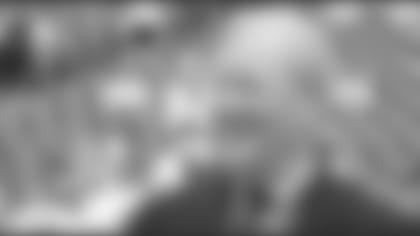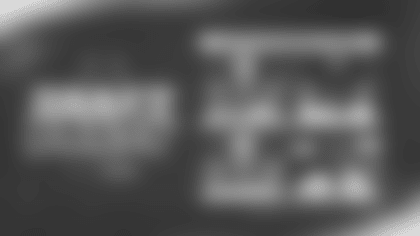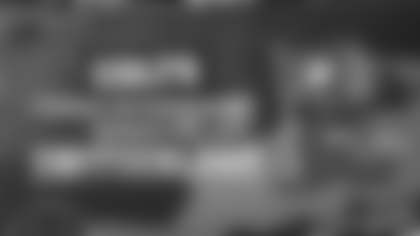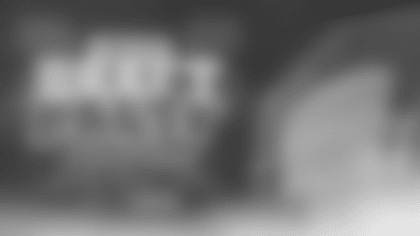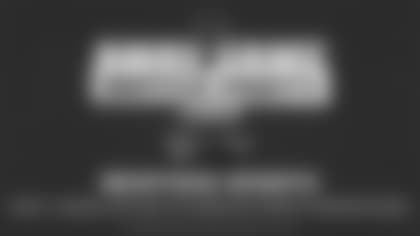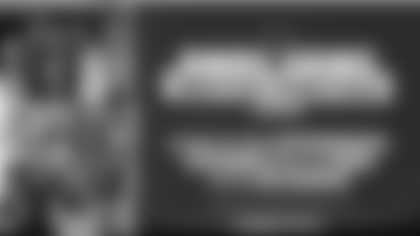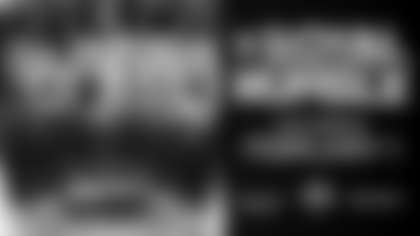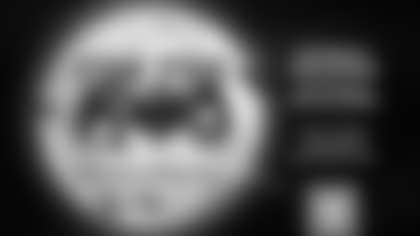Bill Polian, in his 13th season as Colts president, has a
resume unique in the NFL. The only man to win NFL Executive of the
Year six times, Polian in the 1980s built the Buffalo Bills into a
four-time Super Bowl participant. In the mid-1990s, he built the
expansion Carolina Panthers into a team that made the NFC
Championship Game in its second season, 1996. Since joining
Indianapolis in 1998, he built the Colts from a 3-13 team in 1997
and 1998 into one that has made the playoffs 10 of the last 11
seasons, including AFC Championship Game appearances after the
2003, 2006 and 2009 seasons, AFC South titles in 2003, 2004, 2005,
2006, 2007 and 2009, Super Bowl appearances following the 2006 and
2009 seasons and a Super Bowl championship following the 2006
season. Each week during the season, in The Polian Corner, Polian
and Colts.com will discuss issues pertinent to the Colts and the
rest of the NFL.
Q: A 31-28 loss to the Jacksonville Jaguars on Sunday in Jacksonville. What did you see when you reviewed the tape?
A: It wasn't a happy trip home, and it wasn't really a happy day Monday. There's really not a lot to be happy about. But I do always subscribe to a theory taught to me many years ago by (former Baltimore Colts and Miami Dolphins Head Coach) Don Shula – in my opinion the greatest coach in the history of the sport – who said, 'Every time you go out there you have to take something positive away because you have to have something to build on for the next week.' We did do a number of positive things, although we certainly didn't finish the job. Offensively, we went up and down the field. Anytime you score 28 points in the National Football League – albeit the turnovers – you should win. We did not, which was disquieting to say the least. But we did a great job offensively. We ran. We threw. We protected well. We did some good things in terms of play-calling, getting into the right plays. We ran terrifically. Statistics don't mean anything there. We were very efficient running. That's the kind of running we need to have when people play us the way they did. And (running back) Joseph (Addai) had a great day – a great day – in addition to which he did a phenomenal job picking up blitzes, really great. I'm sure it took a great deal out of him. He took a heck of a beating. He left it all out there. So, that's very positive. The turnovers hurt. The interception is just tough luck, I think. We get a coverage that we're not expecting there and they did a great job knocking the ball out. That said, you have to try to find a way to catch it or at least knock it down. (Rookie tight end) Brody (Eldridge) is a young man and he'll learn. He's going to make a lot more big plays before it's all over, so we'll chalk that up to a learning experience. (Veteran wide receiver) Reggie (Wayne) had a phenomenal day. He was working hard to get the first down. Even though it was second down, he's still working hard to get the first down and put us in position to score. To their credit, again, their defense – not in large measure, but in significant measure – out-hustled and out-hit our defense. They made that play. Reggie wasn't careless with the ball. The second guy came in and made a great play. I can live with turnovers like that. Should the score have been 35-31 or 35-28? Perhaps, but I'm not sure we would have felt a whole heck of a lot better given the circumstances. But the offense was really positive, and I give Jacksonville a lot of credit for causing both turnovers. I haven't seen the television replay – and it was very much unclear in the press box – I don't know whether the interception actually hit the ground or not. I can't tell on the tape. It would not have been overturned on replay. Give them credit for making a really good play. In fact, two of those were great plays. They were not necessarily errors on our part, although we want to avoid them. Give them credit for making plays. So, offensively we ran, we threw, we protected well. Special teams, I thought, did a pretty good job with the exception of the penalty, which gave Jacksonville good field position at a time when we didn't need it. We got a good punt and didn't need it. Our punt return game was good and our kickoff return game was terrific, including the injury. We did a good job there.
Q: And defensively?
A: Defensively, a completely different story. There's not a lot to take away positively there except the fact that we kept fighting for four quarters – albeit a lot of difficulty and a lot of lack of cohesion and sub-par games on the part of people you would never think would have those. But we did. We kept on fighting and made a game of it the whole way. We didn't get punched out the way we did in Houston. That's something positive to take from it, but there's obviously a lot of work to do on that side of the ball. We've got to get that straightened away. I think we have good players there, but they're not playing very well at this point.
Q: It seemed like Justin Tryon turned in a really good game, particularly on the last kickoff return . . .
A: He did. Devin (Moore) did a great job (on returns), and so did Justin. Devin's a young player, a rookie. He'll learn. He got 29 yards. 'You did a great job fielding the ball. You made more than something out of nothing. Step out of bounds. Don't get blasted for goodness sake.' I remember the great (former Buffalo Bills running backs coach) Elijah Pitts, who was a member of all of those legendary Green Bay Packer championship teams, telling (Hall of Fame running back) Thurman Thomas when he was a rookie, 'Thurman, discretion is the better part of valor in the NFL. Step out of bounds. Don't take those big blasting hits when you don't have to. Get what you can and don't try to do the impossible.' But Devin did a terrific job and Justin did, too. And we did a good job by and large blocking, so nothing to complain about there.
Q: You discussed the offense, but that unit had two really impressive drives – one of 96 yards and another of 85. It doesn't matter where that group gets the football. The players believe they can score.
A: You would like to have better field position in some cases than we got, but you have to give them (the Jaguars) great credit. Their punter did a great job. He hit one in there. That was a 60-degree wedge. It just dropped dead there in the corner. God bless him. Great job. But we took the ball and marched it down the field. We can do that. We're capable of it. We'll be even better when we get (wide receivers) Pierre (Garcon) and Gonzo (Anthony Gonzalez) back, who add another speed dimension to our offense. We've been doing a terrific job. Kudos to No. 66 (guard Kyle DeVan) for stepping in there for Jamey Richard and doing a great job. He fought like the devil throughout the ball game. Our offensive line did a great job. We did a terrific job against what I thought was the strength of their football team, their defensive front. We did a heck of a job there. No complaints and a lot of positive things to build on. (Wide receiver) Austin Collie continues to do a good job. Reggie had an incredible day. It was certainly a great day and (rookie wide receiver) Blair White did a terrific job, too. He continues to grow in the position, and he'll get better as the days go on. We have work to do on the defensive side, and that's what we need to do. We have to buckle up our chinstraps and pay attention to detail and recognize we have a lot of work to do.
Q: Can you discuss the decision to call timeout with the Jaguars facing 2nd-and-2 from their 31 in the final minute?
A: We called it. The reason we called it was to try and put ourselves in position where we could get the ball back in regulation if we had stopped them. I believe there were 45 seconds or so when they began the drive. I recognize that probably a lot has been made of that. When you think about it in the context that we do – that it's a tool and not the be all and end all – what you recognize is we had four plays after that to shut them down and did not do it, including an interception that should have been caught and should have put the game into overtime if it had not been returned for significant yardage. My old mentor (Hall of Fame Head Coach) Marv Levy said two things about decisions that you make in football games. He said the most important thing that happens is what you do after you make the decision. That is certainly what occurred Sunday. The other thing he would always say – tongue planted firmly in his cheek – that if it didn't work out, whatever you did, you should have done the other thing.
Q: Because the Jaguars threw incomplete on second down, you were one play from getting them off the field.
A: That's correct. We came on a blitz and didn't get it covered. We did get good pressure. They had to get the ball out early. We didn't get it covered. That's the bottom line. Then, we didn't get the 22-yard pass covered that essentially put them in field-goal range, even though we were in a coverage that should have taken care of that. We didn't get the execution we should have. It's what you do after you make the decision. Then just prior to the field goal attempt, he essentially threw an interception that we didn't hold on to. There you go. It's what you do after you make the decision that counts, not the decision.
Q: It seemed three key plays turned things – the interception, the running of Maurice Jones-Drew for Jacksonville and the would-be interception by Kelvin Hayden at the end of the game.
A: Certainly, that (the interception) was a factor, although as I said, I think they earned that more than that was a mistake on our part. There's absolutely no question that the dropped interception and the inability to be cohesive enough on defense to hold Jones-Drew to manageable yardage – Jones-Drew is always going to get his yardage and (Jaguars Head Coach) Jack Del Rio is always going to play us in a manner that allows Jones-Drew get his yardage and he should; he's a good coach and he knows what he's doing, and he knows us well so you have to expect Jones-Drew is going to carry the ball 25 or 30 times and he's going to get his yardage – but you have to hold him to manageable yards and we did not do that. There's absolutely no question that allowed them to do some things in the rest of the game that put us in bad shape. No two ways about that.
Q: It seems the last two games there hasn't much push in the middle and the Jaguars and Broncos each seemed to max pass protect a lot. What can be done there? Is it better to improve the pass rush or the coverage?
A: I think the two go hand in hand. If people are going to max protect, that means there are fewer people out in the pattern. So, you ought to have a better opportunity to defend than you would if they released five (receivers). On Sunday, we got a little bit different protection. It was chip-release protection whereby the two chippers – the tight end and the running back in most cases – waited to chip both (defensive ends) Robert Mathis and Dwight Freeney and then released late. Then, they threw check downs to Jones-Drew on a number of occasions. We were able to stop that pretty well. Denver was a little bit different situation. They were throwing off play action largely and throwing two-man routes, but using the play action to sort of suck up the coverage. It was a totally different situation. I don't think you can manufacture rush consistently, but you can manufacture it from time to time when it's a surprise situation. We did on the last play of the ballgame, and they threw the ball up for grabs. We just didn't catch it. While you're not going to catch it all the time, I wouldn't say it was a tough catch. You have to catch it in those situations. We did, in fact, manufacture rush in that situation. In other situations where we had people coming in, all but two of them we got people home and held them to short gains that did not result in first downs. One resulted in a touchdown and the other resulted in a first down at the end of the game. I don't think our coverage has been terrible and as I said, if people are going to max protect, you should get people in coverage. I think it goes hand in hand.
Q: When you have two parts of a team playing at different levels, how do the coaches keep confidence and trust in one another?
A: The one thing you have to do is keep your nose to the grindstone, keep your head down and keep working. No matter what the other platoon is doing, you have to do on your side of the ball whatever it takes to win. If everyone does that, and doesn't worry about the other guy's job, only his, then you'll come out all right in the end. It's the head coach's job to tie it all together. (Colts Head Coach) Jim Caldwell does a great job of that. I don't have any worries about that, and the way to avoid that difficulty is to simply keep your head down and do your own job and don't worry about how well or how poorly the other platoons are playing. Concentrate only on your job and the head coach will get that strategically adjusted if he needs to.
Q: There appeared a possible interference penalty involving wide receiver Austin Collie at one point Sunday. You agreed with the call and you said the officials are calling interference correctly so far this season . . .
A: It's early in the season. We're four games in, so let's do this with lots of trepidation, but thus far, it really has been very consistent. (Former NFL Vice President of Officiating) Mike Pereira in his column last week gave kudos to Neely Dunn, who is the supervisor in the league office who deals with the downfield officials and defensive and offensive pass interference. Mike, who sees every game, basically said they've become a lot more consistent. I think that's true, and I hope it holds up over the course of the season. Ron Winter is a good official, and his crews are usually among those who call the most penalties, and they don't call chintzy ones. As I said, I think everybody has become more consistent in that call. I hope it holds up.
Q: In the second series Sunday, the Colts had to punt. It appeared the gunner was wide open and punter Pat McAfee could have thrown the ball to him. Does McAfee have the authority to audible to that sort of play?
A: He does, except in that situation there was quite a long distance to go for the first down. That's No. 1. No. 2, at that point on the field, that's probably a pretty good gamble for them, because what we're saying is, 'We're going to play field position there that early in the game and not take a gamble and maybe not make the first down.' Had it been 10 yards to go, seven yards to go, six yards to go, I'm certain we throw it. With that long to go – it was 15-plus yards, I believe – we would not run that risk at that point on the field at that point in the game. That said, somebody tries it again the ball's coming out of there. You can play it safe one time, but if someone wants to try to do that on a steady diet to us, we'll throw.
Q: On the third down play when the Colts blitzed on the final drive, why didn't the defenders press the receivers?
A: That's a good question and something I haven't gotten the answer to yet. But it's certainly a good question, and I'm going to ask it myself. We were off seven yards and if you're blitzing in that situation, the ball's coming out early. Now, you can align seven yards off. That's fine to disguise it, but you better attack the route immediately, because you know the ball's coming out. One of (former Colts Head Coach) Tony Dungy's favorite phrases was, 'You need to know when the blitz is called that the ball is coming out.' That's what I mean by lack of cohesion. We weren't as cohesive as we should have been. You need to be on top of that situation. That's why we took the timeout, to make the ball come out early, go up there and make the tackle and knock it out and get the ball back.
Q: Were the Colts in a soft Cover 2 at the end of the game?
A: No. First of all, we don't play soft Cover 2. The only time we would play soft in that situation would be at the end of the game where we're in a victory defense and trying to keep everything in front of us. In that situation, where we were trying to take the ball away and prevent a big gain to get them in field-goal range, we weren't playing soft at all. We just didn't react properly to the route. Had we reacted properly to the route, there's every likelihood he has to make a different throw and we knock it out or maybe even intercept it. Then, of course, on the following play, we blitzed and got the ball to come out early and should have intercepted it. But we were not playing soft. We were playing anything but that. Pretty aggressive, as a matter of fact.
Q: How much is consistency being discussed?
A: That goes directly to the heart of a statement I made earlier. The question was, 'How do you keep confidence and trust in one another?' The answer is, 'Don't worry about it.' The way to develop consistency – and I'll paraphrase the great John Wooden here – the best way to help the team is to improve yourself. So, everybody on the team has to do the best they can do. If they do that, if they concentrate on doing their job correctly, if they concentrate in preparing as best they can, if they concentrate on going out and playing as hard as they can all the time, then everything will work out well in the end. You're going to have in the National Football League some weeks where you have good match-ups for the offense and poor match-ups for the defense, as was the case Sunday. You'll have some weeks where you have poor match-ups for the offense and good match-ups for the defense. Those things happen. There's a 'ying' and a 'yang' involved in it, but the best way to handle it is to make yourself the best player you can be, make your platoon the best platoon it can be and in the end, the team will be better for it.
Q: Is it a staff decision or is it (Coach) Caldwell's decision on whether to take a timeout at the end of the game?
A: It's Coach Caldwell's decision. It's a tough call. People wouldn't be talking about it if it were an easy one. It's what you do after you make the call that is the key. In fact they did throw an incompletion. They did in fact throw a ball that we should have intercepted, so those things factor in, too. You make the decision and you live with it. One thing Coach Caldwell mentioned was he was not anxious to go into overtime. That's because the defense was struggling. If he could get them off the field in that situation, then perhaps we'd get a chance to go down – and No. 18 does perform miracles, lots of them. The odds were in our favor there, in addition to which we could have blocked a punt and we have a great punt returner in (cornerback) Jerraud Powers who came within an eyelash of busting one the previous punt return. Those two factors come in there, too. Coach weighs all the factors when he makes a decision. But as I said earlier, and I'll quote Marv Levy and it's a pretty good source as a Hall of Fame coach, 'It's what you do after you make the decision that really counts.' I don't think they were a lock to run the clock out. Not by any means. They had times out. I think Jack was just waiting to see what the situation was. With 2nd-and-2, he might have taken a time out and said, 'Hey, we're going to take three shots at this and see if we can get into field-goal range.' I don't think that was a given either.
Q: The Kansas City Chiefs are next. They're 3-0 and the last unbeaten team in the NFL.
A: They're 3-0 because they're playing good football. What makes it tougher for us is Charlie Weis, their offensive coordinator, and Romeo Crennel – their defensive coordinator – were both with the New England Patriots when we played them every year with all the marbles on the line – they found a way to play us and beat us. That stands them in good stead. This is another team – like Houston, like Jacksonville – that knows how they want to play us. Romeo did a great job of rope-a-dope when he was in Cleveland as the head coach (in 2008). They know how to play us. They have many more weapons – Charlie does – at their disposal than Romeo did in Cleveland. They have a dynamic third-down player (Dexter McCluster), a return guy, a home-run hitter. They have (running back) Thomas Jones and they have (running back) Jamaal Charles, who's averaging seven yards a carry. So, Charlie can come at you with a three-headed attack. In the return game, they have Javier Arenas, a rookie who is as good and as exciting a return man as there is in football. Scott Pioli, their general manager, had the opportunity of two good drafts, and he has done a good job. This team is for real. Their going to be in the hunt the whole way, and it's a tough ball game on our part. We've got a lot of work to do. I said you have to put a good face on things and be positive, but you can't gloss over the fact that we have a lot of work to do to be a good football team. Bill Parcells is fond of saying, 'You are what your record says you are.' Right now, we're a pretty mediocre football team, so we have work to do.



